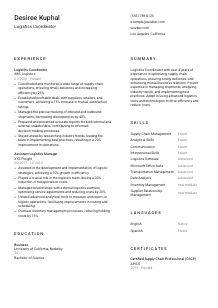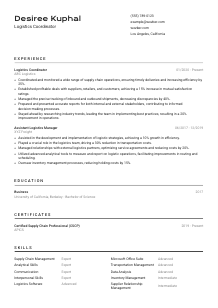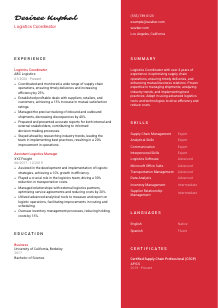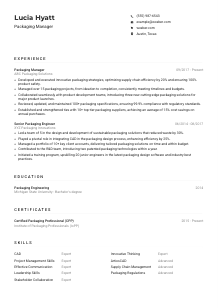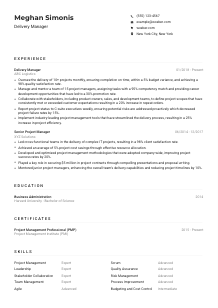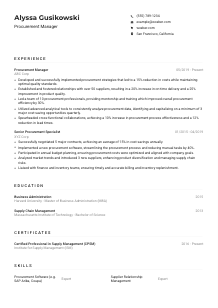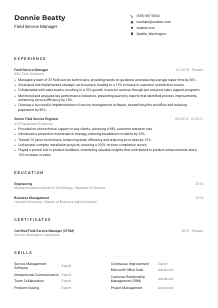Logistics Coordinator Resume Example
Juggling shipments, but your resume is at a red light? Navigate through this Logistics Coordinator resume example, created with Wozber free resume builder. Discover how you can seamlessly chart your organizational savvy to match job specs, and deliver your logistics career to its next destination!
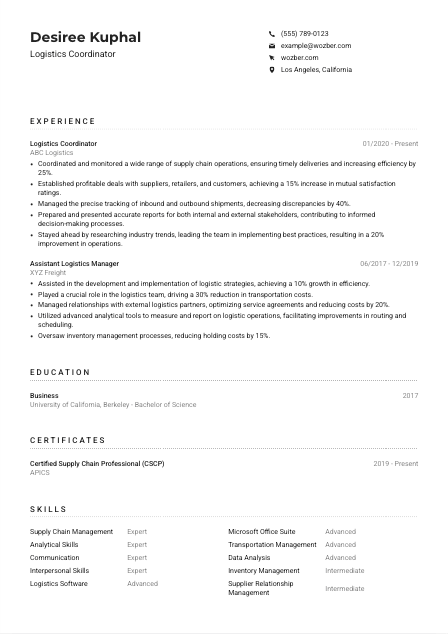
How to write a Logistics Coordinator resume?
Hello! If you're eyeing a Logistics Coordinator position, you understand the importance of efficiency, communication, and precision. Just as you would ensure a smooth supply chain process, your resume demands the same meticulous planning and execution. This guide, powered by Wozber's free resume builder, is your roadmap to creating a resume that not only resonates with the job description but also passes through Applicant Tracking Systems (ATS) with ease.
We'll dive deep into the core sections of a resume tailored for a Logistics Coordinator role, infusing industry-specific details to make your application truly shine. Let's deliver an ATS-compliant resume that lands you that coveted interview!
Personal Details
First impressions matter, and your Personal Details section is the gateway to capturing a hiring manager's interest. For a Logistics Coordinator position, showcasing reliability and attention to detail starts here. Follow these steps to ensure your introduction is as polished and precise as the logistics operations you aim to manage.
1. Make Your Name Your Brand
Place your name prominently at the top. Consider using a slightly larger font size to ensure it catches the eye. The right presentation sends a message of professionalism and pride in your identity.
2. Align Your Title
Directly below your name, specify your career title. Aligning it with the job you're applying for, such as 'Logistics Coordinator,' shows relevance and instantly tells the hiring manager that your experience and skills are a match.
3. Essential Contact Information
Include your phone number and a professional email address. A tip here is to opt for an email format like firstname.lastname@email.com, demonstrating attention to professionalism. Remember to verify these for accuracy - a small typo could mean a missed opportunity.
4. Mention Your Location
"Los Angeles, California" is not just a location; it's a requirement for this role. Including your city and state confirms you're a local candidate, eliminating any concerns about relocation logistics.
5. Link to Your Professional Online Profile
If you have a LinkedIn profile or a personal website showcasing your professional accomplishments or portfolio, include it. Ensure it's up-to-date and reflects the same professionalism displayed in your resume.
Takeaway
The Personal Details section is your handshake, setting the tone for the rest of your resume. Craft it with care, ensuring every piece of information you include is purposeful and positions you as the ideal candidate for a Logistics Coordinator role.





Experience
The Experience section is where you shine a spotlight on your professional journey, illustrating how your past roles have prepared you for the Logistics Coordinator position. It's about painting a picture of a competent, results-driven professional.
- Coordinated and monitored a wide range of supply chain operations, ensuring timely deliveries and increasing efficiency by 25%.
- Established profitable deals with suppliers, retailers, and customers, achieving a 15% increase in mutual satisfaction ratings.
- Managed the precise tracking of inbound and outbound shipments, decreasing discrepancies by 40%.
- Prepared and presented accurate reports for both internal and external stakeholders, contributing to informed decision‑making processes.
- Stayed ahead by researching industry trends, leading the team in implementing best practices, resulting in a 20% improvement in operations.
- Assisted in the development and implementation of logistic strategies, achieving a 10% growth in efficiency.
- Played a crucial role in the logistics team, driving a 30% reduction in transportation costs.
- Managed relationships with external logistics partners, optimizing service agreements and reducing costs by 20%.
- Utilized advanced analytical tools to measure and report on logistic operations, facilitating improvements in routing and scheduling.
- Oversaw inventory management processes, reducing holding costs by 15%.
1. Dissect the Job Requirements
Begin by breaking down the job description. Note responsibilities like 'coordinate and monitor supply chain operations' and align your past roles with these tasks, demonstrating a clear fit.
2. Chronological Format
List your experience in reverse chronological order. This format showcases your most recent accomplishments first, keeping the hiring manager engaged with your current capabilities.
3. Highlight Achievements
For each role, focus on your achievements that resonate with logistics coordination, like "Managed tracking of inbound and outbound shipments, decreasing discrepancies by 40%." Quantifying your accomplishments with percentages or numbers proves your effectiveness.
4. Showcase Relevant Metrics
Whenever possible, use metrics to describe your achievements. Saying you "increased efficiency by 25%" is much more powerful and gives a tangible sense of your contribution.
5. Prioritize Relevance
Ensure every point emphasizes skills and experiences directly relevant to logistics coordination. Irrelevant achievements, no matter how impressive, can distract from your suitability for the role.
Takeaway
Just like coordinating a complex supply chain, aligning your experience with the job's demands requires careful planning. Make each point evidence of your ability to exceed as a Logistics Coordinator, demonstrating clear value to prospective employers.
Education
In the Logistics Coordinator role, your educational background sets the stage for your expertise. Aligning your education with the job requirements signals to hiring managers that you've got the theoretical foundation to match your practical experience.
1. Match the Job's Educational Requirements
The job calls for a Bachelor's degree in Business, Supply Chain Management, or a related field. Ensure your degree is prominently listed, directly connecting your education to the job's demands.
2. Clear and Concise
Present your educational background in a clean format: Degree, Field, Institution, Graduation Year. Clarity here allows the hiring manager to quickly verify that your qualifications meet the role's requirements.
3. Echo the Job Description
"Bachelor of Science in Business" doesn't just check a box; it affirms your relevant educational background, perfectly mirroring the job's criteria.
4. Relevant Courses and Achievements
While the broader degree might cover the bases, highlight any courses or achievements that show depth in areas critical to logistics and supply chain management, adding another layer to your qualifications.
5. Beyond the Degree
If you've participated in relevant extracurricular activities, led projects, or were part of clubs that emphasize leadership or logistical skills, mentioning these can add valuable context to your educational background.
Takeaway
Your education section is more than a list; it's proof of your preparedness for the Logistics Coordinator role. Emphasize the aspects of your education that most align with the job, showing you're not just qualified – you're the precise fit.
Certificates
In the world of logistics and supply chain management, certificates can be a powerful testament to your commitment to ongoing professional development. Let's examine how to display them in a way that adds weight to your resume.
1. Right Fit Certificates
Even though the job doesn't list specific certifications, including relevant ones like 'Certified Supply Chain Professional (CSCP)' from APICS shows dedication to your craft.
2. Present with Purpose
List certificates that reinforce your qualifications for the Logistics Coordinator role. This selective approach ensures the hiring manager sees a cohesive profile.
3. Dates Matter
Including the acquisition or validity dates for certifications (e.g., '2019 - Present') informs employers of your current knowledge level, especially in a field as dynamic as logistics.
4. Continuous Learning
Staying abreast of industry best practices and advancing technology through certifications is key. Regularly updating this section reflects your growth mindset – a valuable asset in logistics coordination.
Takeaway
Selected certifications can enhance your profile, distinguishing you as a candidate who goes above and beyond. Make sure each certificate you include aligns with the Logistics Coordinator role, underscoring your specialized expertise.
Skills
The Skills section of your resume is a concise showcase of the tools in your professional toolkit. For a Logistics Coordinator, this entails a blend of hard and soft skills tailored to the demands of the role.
1. Essential Skills
Start by listing the skills directly mentioned in the job description, like 'Supply Chain Management' and 'Analytical Skills.' Your resume should mirror the language of the job posting for ATS optimization.
2. Balance Hard and Soft Skills
Blend industry-specific skills (e.g., 'Logistics Software', 'Microsoft Office Suite') with essential soft skills ('Communication', 'Interpersonal Skills'). This mix illustrates your versatility.
3. Precision is Key
Prioritize skills that are most relevant to a Logistics Coordinator. Avoid overloading this section; instead, focus on quality, showing that you've carefully considered what makes you a standout candidate.
Takeaway
Approach this section strategically, choosing skills that not only match the job description but also highlight your unique competencies. This tailored approach ensures you present as the ideal candidate, fully equipped for the challenges of logistics coordination.
Languages
In the diverse field of logistics, the ability to communicate across cultures can be a significant asset. The Languages section showcases your ability to navigate global interactions, an increasingly valuable skill in logistics coordination.
1. Core Language Requirement
Given that 'Competence in English communication is crucial,' ensure English is listed first with your proficiency level accurately represented, confirming you meet this essential requirement.
2. Additional Languages
If you speak other languages, list them in order of proficiency. This could be particularly advantageous for roles involving international supply chains or diverse teams.
3. Honest Proficiency Rating
Be precise about your levels of proficiency ('Native', 'Fluent', 'Intermediate', 'Basic'). This honesty helps set realistic expectations and demonstrates integrity.
4. Tailor to the Role
Consider the reach of your potential logistics operations. If the role involves global coordination, emphasizing your language skills casts you as a more versatile candidate.
5. Global Mindset
In logistics, understanding cultural nuances can be as critical as managing logistical challenges. Highlighting your language skills reflects a global mindset, an invaluable trait in today's interconnected world.
Takeaway
Your linguistic abilities demonstrate more than just communication skills; they show a capacity for empathy, adaptability, and global awareness. In logistics coordination, these are key to navigating the complexities of international supply chains and multicultural teams.
Summary
The Summary section is your opportunity to encapsulate your professional identity, offering a snapshot of your most significant achievements and skills. For a Logistics Coordinator, it's about striking the perfect balance between detailed accomplishment and strategic brevity.
1. Role Alignment
Start with an overarching statement that captures your essence as a professional, tailored to the Logistics Coordinator role. Indicating your years of experience and core competencies sets the stage.
2. Highlight Key Skills
Mention skills and experiences that align directly with the job description, such as 'optimizing supply chain operations' and 'managing shipments.' This emphasizes your suitability for the role.
3. Quantify Achievements
Quantify your impact in previous roles whenever possible, as in 'ensuring timely deliveries and enhancing mutual business relations.' Numbers lend credibility to your claims.
4. Conciseness Wins
Keep your summary tight and impactful. This section is a teaser that invites the hiring manager to dive deeper into your resume, so make every word count.
Takeaway
Your summary is the elevator pitch of your professional story. Craft it with care, ensuring it instantly communicates your value as a Logistics Coordinator capable of handling the complexities and demands of the role.
Launching Your Logistics Coordinator Journey
Congratulations on taking this detailed journey through creating an impactful, ATS-compliant resume for a Logistics Coordinator position. Remember, your resume is a living document. Adjust and refine it as your experience grows and as you target new opportunities. With the guidance provided here and the assistance of Wozber's free resume builder, ATS-friendly resume templates, and ATS resume scanner, you're well on your way to making your mark in the logistics field.
Ready to advance your career? Fine-tune your personal pitch, and let your resume open the doors to new adventures.

- Bachelor's degree in Business, Supply Chain Management, or related field.
- Minimum of 3 years of experience in logistics or supply chain management.
- Proficiency in logistics software tools and Microsoft Office Suite.
- Strong analytical and problem-solving skills.
- Excellent communication and interpersonal skills.
- Competence in English communication is crucial.
- Must be located in Los Angeles, California.
- Coordinate and monitor supply chain operations to ensure timely delivery.
- Communicate with suppliers, retailers, and customers to achieve profitable deals and mutual satisfaction.
- Manage the tracking of inbound and outbound shipments and report any delays or discrepancies.
- Prepare accurate reports and documentation for both internal and external purposes.
- Stay up-to-date with the latest industry trends and best practices to implement continuous improvements.





